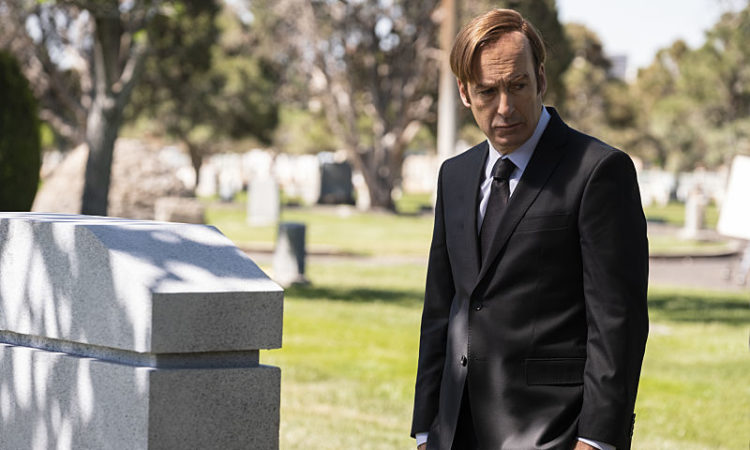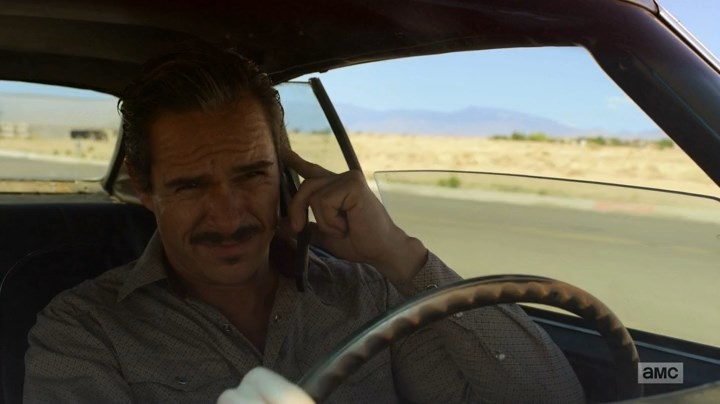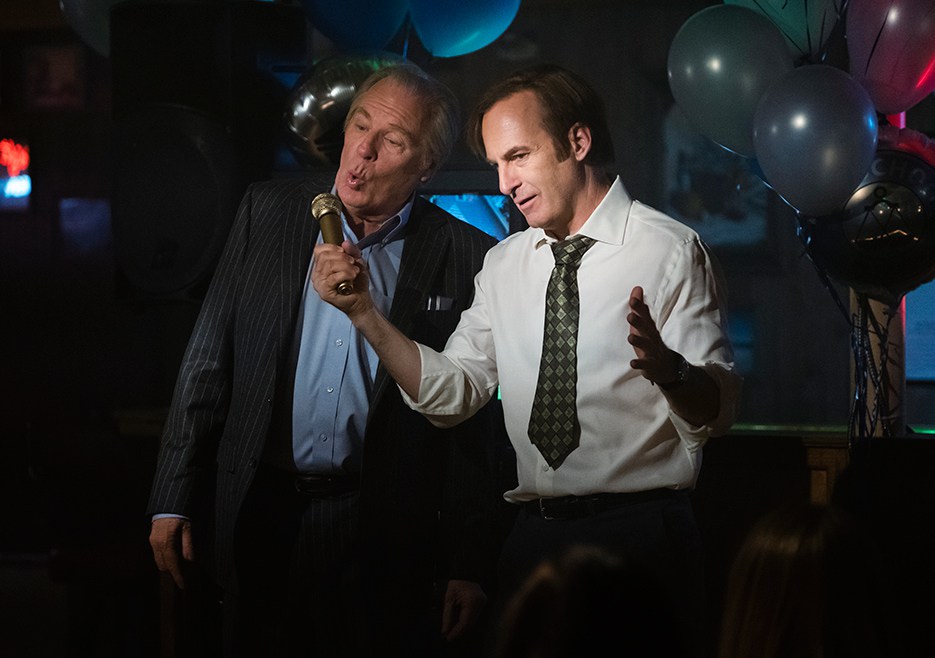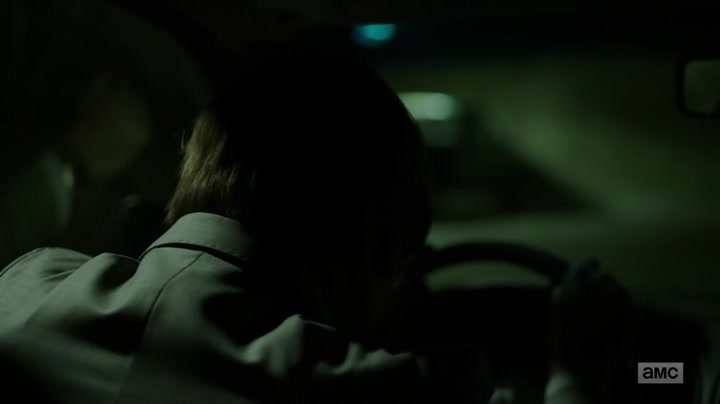This whole season, Kim Wexler, and the audience, have been waiting for Jimmy McGill to truly deal with his brother’s death, to genuinely confront Chuck’s passing, rather than try to move on as though nothing had happened. From the season premiere, where Jimmy brushed off Howard’s tortured confession with an unbothered air, to last week’s tantrum over being denied his reinstatement, we’ve seen Jimmy do nothing but sublimate his feelings about his brother’s death. We’ve seen him repress them, run from them, and act out because of them, but never really face them head on.
Those feelings are at the core of “Winner”, the final episode of Better Call Saul’s fourth season. Jimmy’s latest scheme calls on him to cry crocodile tears over Chuck’s grave on the anniversary of his death. He has to become earnestly involved in scholarship grants made in Chuck’s name, to “anonymously” throw a party for the newly christened Chuck McGill Memorial Reading Room, and to seem too broken up to enjoy any of it. It’s all a big show, to attract as many members of the local bar as possible, in the hopes that word of grief will get back to the committee judging his disciplinary appeal.
It’s an effort to put on grief, to wear it like a mask, for mercenary, self-serving purposes. The knock on Jimmy, the thing that held him back at his first hearing, was his lack of concern or remorse for his brother. So he and Kim send every signal imaginable to the legal community, in lugubrious tones, to show Jimmy as a broken man, still shaken up by his brother’s passing and only withholding mention of Chuck because the memory is too painful to bear.
As usual, it’s a good plan! It’s hard to know for sure whether the signs of Jimmy’s faux grief actually make it back to the review board, but they at least seem to be effective on his immediate prey. And Kim is there by his side, shooting down his more outlandish ideas, workshopping his speech to the disciplinary committee, and helping her partner mislead people in the hopes that he can regain something taken away from him.
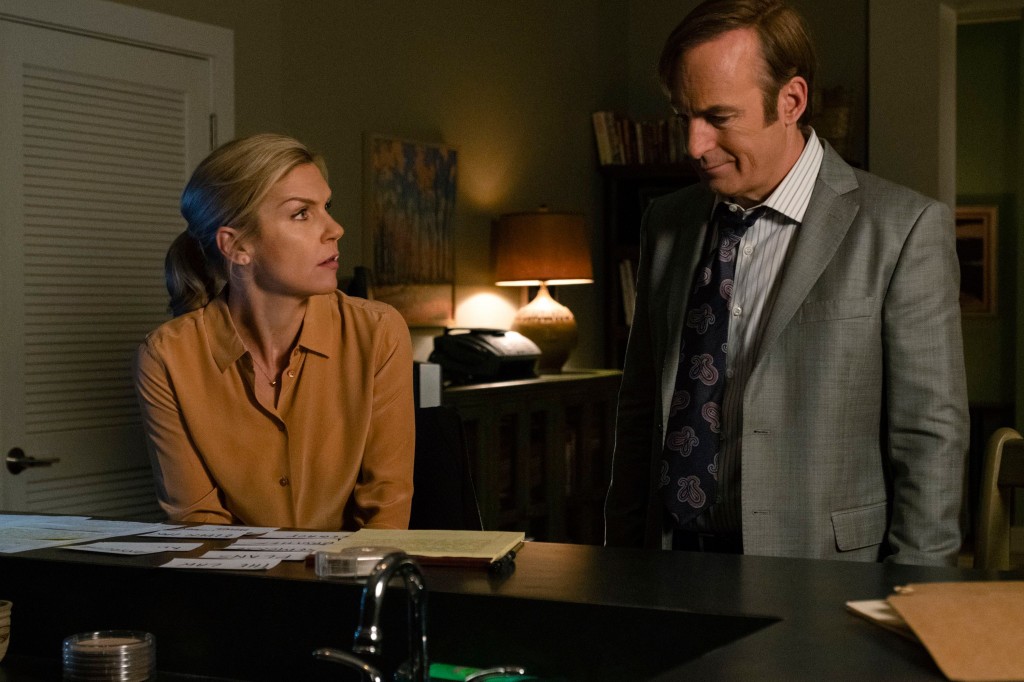
"And then I figure, right in the second act we blow the lid off the place with the ol' 'saw the assistant in half' routine!"
But the lynchpin of the scheme is Jimmy’s statement to the review board. He goes in with a plan to simply recite Chuck’s letter, wanting to let his brother’s eloquent sentiments carry the day, so that he doesn’t have to try to muster any genuine feelings and potentially seem insincere. But in the moment, Jimmy breaks from the script. He improvises. He offers what sounds like an honest assessment of his relationship with his brother — the reasons why he became a lawyer, the difficulty of gaining Chuck’s approval and trust, the truths about Chuck’s demeanor and the hardships their relationship faced at times — that help anyone listening better understand and, ultimately, feel for Jimmy.
The impact of his words is heightened by the episode’s fraternal, karaoke cold open, where we see Jimmy seem needling but caring, Chuck seem condescending but proud, and the two of them seem like genuinely loving siblings to one another. These scenes show how far the two had come and how much losing that must have affected Jimmy, particularly as he seems to bare his soul to the appeal board.
The speech clearly moves Jimmy’s reviewers. It causes Kim to wipe away a tear. And you’d have to be made of stone to sit in the audience and not feel something as Jimmy offers what sounds like a heartfelt, honest, and long-awaited eulogy for his brother and their complicated but meaningful relationship.
But it turns out to be another canard, a put-on, a lie. It is an echo of a similar faux-sentimental spiel from Chuck, and once again, I almost believed it. Jimmy revels in having put one over on the review board. His cravenness about tugging at their heartstrings astounds Kim, underscoring her worst fears about the man she loves. The reality is that there was no truth in Jimmy’s seemingly sincere pronouncements. There was no outpouring of grief or real feeling in that confessional moment, or if there was, it was anesthetized and commoditized and used for dishonest purposes.
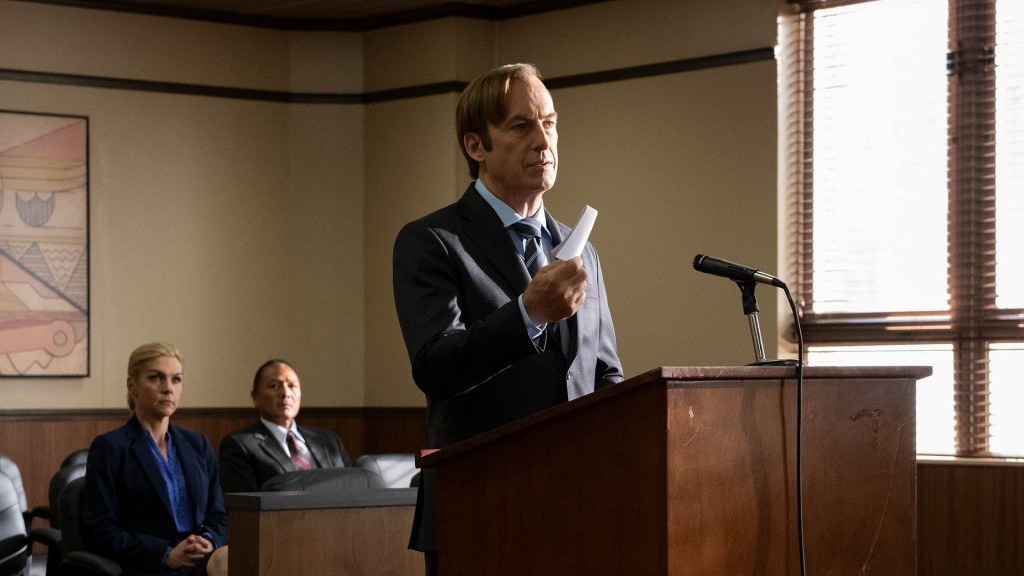
"And I truly feel that these crayon drawings I did during my suspension best indicate why I should be reinstated as an attorney."
After tearfully echoing the passage from his brother’s letter, about his pride in sharing the name McGill, Jimmy asks for a “doing business as” form, so he can practice under a pseudonym instead. Saul Goodman, the scruple-free lawyer to the seedy underbelly of Albuquerque, emerges from the ashes of his brother’s life and name. For ten episodes, we’ve been waiting for Jimmy to acknowledge what his brother meant to him in some genuine way, and instead, he gives us, the review board, and most notably Kim, what turns out to be just another performance.
It is, in a strange way, a negative image of Mike’s actions in the episode. When Mike speaks to Gus about Werner’s disappearance, he seeks mercy on his friend’s behalf, trying to avoid a lethal response from his employer. He pleads caution, forgiveness, and the possibility of everyone moving on. But when he speaks to Werner himself, he’s colder, angrier, more curt and practical in the way we’ve come to think of as the default for Mr. Ehrmantraut. He too has a divide between the face he presents in his professional life and the one he presents to his erstwhile friend. The difference is that for Mike, both of those faces are true.
“Winner” gives us a good cat-and-mouse game between Mike, Werner, and Lalo Salamanca even as Mike is torn between those two parts of himself. For all the heady material in Better Call Saul, it’s hard not to enjoy the petty thrills of detective work and car chases gone wrong. Seeing Mike pose as a concerned brother-in-law and piece together where Werner’s hiding out is an absolute treat. And the way he manages to lose Lalo — with a ploy using gum in the ticket machine — is tons of clever fun.
Lalo himself, on the other hand, really drags this portion of the episode down. Lalo’s a little too cartoony of an antagonist for a heightened but still down-to-earth show like Better Call Saul. The fact that he silently leaps to and crawls through the ceiling like he’s freaking Spider-Man was patently ridiculous. And his single-minded pursuit of Mike and his ability to ferret the same details out veered too far into the realm of convenience and contrivance. I appreciate the promise of greater friction to come between Gus’s operation and the Salamancas, but the bulk of Lalo’s business in this episode was unnecessary, and it also kept Nacho, who’s been underserved in general this season, on the sidelines once again.
Still, this plot does lead to a moving but tragic scene between Mike and Werner, when it becomes clear that a Gus-ordered punishment needs to be doled out. Werner’s naive requests to see his wife, Mike’s matter of fact resignation about what has to happen, and his quarry’s slow realization of the position he’s put himself in, all unspool slowly and poignantly.
The upshot of their extended, hauntingly-lit scene is simple enough, though. Mike found a friend, and now he has to kill him. For all the car chases and puzzles to be solved, his part of “Winner” comes down to that tragic, human reality. There’s a raw sadness in Mike’s eyes, evident beneath the anger, at the fact that it’s come to this. There’s an echoed tragedy for Werner when he tells Mike that he believed this little escapade would result in some frustration, but ultimately forgiveness and understanding from Mike, because they’re friends.
There’s no room for friends in this line of work, at least not when you work for Gus Fring. Ultimately, regrettably, it’s not up to Mike. Underneath the stars of New Mexico, in a wide shot, with a spark and a silhouette, you see him end the life of someone he’d rather let go, because he has to, because it’s his job. Werner is the first man that Mike kills for Gus, but he won’t be the last. And it all starts with someone who made one mistake, that can’t be forgiven, because the powers that be would never allow it.
That’s what ties Mike’s portion of the episode to Jimmy’s. Jimmy delivers what is basically the unofficial Saul Goodman manifesto to a young woman who was denied one of the Chuck McGill scholarships. Jimmy is incensed (nominally on her behalf) that she didn’t receive due consideration by his colleagues because she’d been caught shoplifting, because she made one mistake. And he tries to give her a roadmap to survive, revealing his own worldview in the process.
Jimmy tells her that opportunities for respectability like that scholarship are false promises, dangled in front of lesser-thans to convince them they have a shot when, in reality, they were being judged and judged harshly before they even stepped in the door. He declares that the system is stacked against people like them. The rules are made to benefit the squeaky clean and already fortunate. So don’t abide by them. Make your success without them. Do what you have to do. Rub their nose in your success rather letting yourself be cowed by something unfair and biased. The world will try to define you by one mistake, but fight back and, above all, don’t let them win, no matter what it takes.
That’s a comforting worldview in some ways, one that lets the viewer off the hook for siding with Jimmy. We want to like our main character. He’s affable. He’s fun. He’s good at what he does. It’s easy to buy into his thinly-veiled self-assessment — that the well-heeled system is unwilling to overlook the less-credentialed but still hardworking individuals who’ve had missteps but overcome them, so he has to fight dirty. It’s tempting to buy into that narrative, to accept that the people with power aren’t playing fair, so why should he? Why shouldn’t he scratch, claw, fight, and cut corners along the way to getting what he thinks he deserves?
But the truth is that “the system” hasn’t done much to keep Jimmy down. Howard Hamlin wanted to give him a job when he became a lawyer. Davis & Main gave him every opportunity to succeed. Even the disciplinary committee is not off base in questioning Jimmy’s penitence and sincerity when he offers no remorse for the person he hurt. Sure, a few folks have turned up their noses at Jimmy, and he’s made plenty of his own mistakes, but it’s not “them” trying to hold Jimmy McGill down. It’s “him.”
That’s the trick of this season finale. Despite all the put-ons and subterfuge, Jimmy does finally and honestly reckon with the death of his brother. He just does it by anchoring his feelings on a set of unseen forces, ones he thinks are set against him, rather than a decaying body in the cold ground.
It’s Chuck who tried to keep Jimmy from reaching an even keel. It’s Chuck who instigated the disciplinary proceedings that continue to be a thorn in Jimmy’s side. It’s Chuck who judged his younger sibling solely on his mistakes, who overlooked his hustle, who saw those missteps as the sum total of all that Jimmy was or could be. When Jimmy rails against the tacit conspiracy he thinks is holding him down, when he uses that as an excuse to color outside the lines, he’s really railing and rebelling against his brother, and processing his lingering feelings of anger and hurt and grievance with Chuck, that no longer have a living object of blame to sustain them.
So instead, Jimmy decides that he has to be the winner. If Jimmy is denied his reinstatement, if a young woman with a checkered past but a bright future can’t earn a scholarship in his brother’s name, if it’s ultimately judged that someone like Jimmy won’t be allowed in the profession of someone like Chuck, then it means that Chuck won. And after all he’s been through, Jimmy can’t bear that.
Despite his brother’s death, we only see Jimmy cry real tears once this season. It’s not in front of the review board. It’s not in a quiet moment with Kim. It’s in his car, by himself, when the engine won’t start, when he feels stymied, when it seems like the forces Chuck set in motion will pull him under for good, as though the universe itself is confirming his brother’s harsh assessment.
There is true grief within Jimmy McGill’s soul, a genuine source of pain caused by a severe loss. But that loss didn’t happen when Chuck died. It happened when Chuck broke his heart, turned him away, and told him that he didn’t matter. As with others in television this year, death didn’t mean the loss of a friend or a confidante for Jimmy; it meant the end of a possibility for approval, for pride, and for the sort of loving family relationship Jimmy had always wanted and thought he might one day gain.
There is truth in those tears behind the wheel of an off-color sedan, a mourning in private to contrast with the show he puts on in public. And Saul Goodman — the real Saul Goodman — is born in their aftermath. Because if Jimmy couldn’t earn his brother’s love, then at least he can win. He can try to become what Chuck never thought he would, reach heights his brother never reached, no matter what lies he has to tell, what corners he has to cut, or whom he has to hurt to get there.
That’s Jimmy’s truth now. That’s his response to Chuck’s death, and it’s the force that moves him from the decent, concerned man we met at the beginning Better Call Saul to the amoral, win-at-all-costs heel who emerges with his new name. It’s a name meant to separate him from his brother, separate him from the rules and expectations that living in Chuck’s shadow created, and separate him, once and for all, from the pain he’s been running away from all this year.

